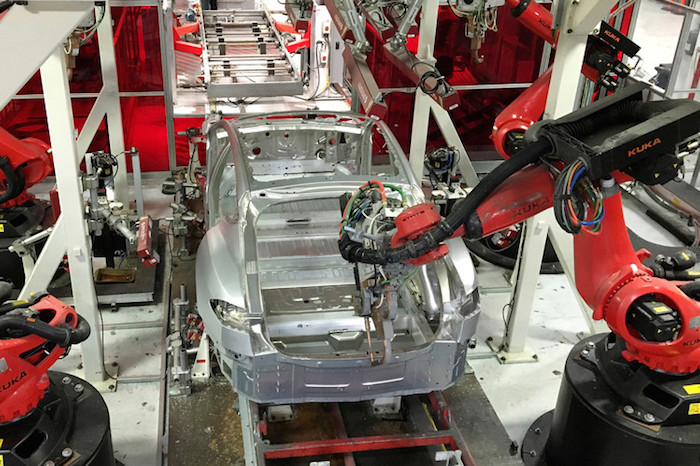
08/28/2017
It’s interesting how Democrats on average seem more aware of how automation threatens the economic system of most of the world, and the resulting mass unemployment must be faced with planning. Perhaps it’s because the Ds are more comfortable with handing out cash (one suggested solution, namely Universal Basic Income), while Republicans see smart machines are just another way to make money.Why haven’t the big brains in Washington noticed how whole industries — like automotive manufacturing — are now largely operated by robots, and that’s only the beginning?

For example, the current Treasury Secretary Steve Mnuchin was noticed by the tech community in a bad way when he said about robots taking many American jobs that “It’s not even on our radar screen … 50-100 more years.” But he’s not unusual.
Experts in the subject see automation differently. Oxford researchers forecast in 2013 that nearly half of American jobs were vulnerable to machine or software replacement within 20 years. Rice University computer scientist Moshe Vardi believes that in 30 years humans will become largely obsolete, and world joblessness will reach 50 percent. The Gartner tech advising company believes that one-third of jobs will be done by machines by 2025. The consultancy firm PwC published a report earlier this year that forecast robots could take 38 percent of US jobs by 2030. Forrester Research Inc. has a more optimistic view, that there will be a net job loss of 7 percent by 2025 from automation.
Below, a highly automated BMW factory in 2014, where a few human workers can be seen:
It’s nice that Supervisor Kim is looking ahead to deal with more automation-caused job loss, but I’m guessing she won’t mention that …
Automation Makes Immigration ObsoleteWhen a third or a half of Americans are unemployed because of machines doing the jobs, we certainly won’t need to import foreign workers.
Automation could kill 2x more jobs than the Great Depression — so San Francisco lawmaker pushes for Bill Gates’ ‘robot tax’, CNBC, August 24, 2017Robots are going to replace human workers and when they do, the companies that employ them should be taxed.
So says billionaire Bill Gates. And now, San Francisco lawmaker Jane Kim thinks so too.
In February, in an interview with Quartz, the Microsoft co-founder broached the idea of a “robot tax.”
“Right now, the human worker who does, say, $50,000 worth of work in a factory, that income is taxed and you get income tax, social security tax, all those things. If a robot comes in to do the same thing, you’d think that we’d tax the robot at a similar level,” he says.
City Supervisor Kim, who is also running for the State Senate, is a proponent of the “robot tax” and is working on an upcoming ballot measure.
Wednesday she launched the Jobs of the Future Fund, an initiative to drive conversation among state business leaders, politicians and local civic organizations about how to prepare for an increasingly automated workforce.
“Some estimates have projected that as many as 50 percent of current American jobs will be lost through the transition to robot, algorithms or other forms of automation,” the Jobs of the Future Fund website says.
“Unemployment peaked at 10 percent during the Great Recession and almost 25 percent during the Great Depression,” according to the site. It also points to estimates that say automation will replace between 38 and 47 percent of jobs in coming decades, which is more than the Depression and the Great Recession combined.
“An unemployment rate of 38 percent or 47 percent would be a national crisis like we have never seen and would certainly result in spikes in evictions, homelessness and crime. We must act now because the price will be too great if we wait,” according to the site.
Money collected with Kim’s proposed robot tax would be used to educate and train out-of-work employees for new jobs. It would also be invested into new industries, the Jobs of the Future Fund website says.
Another increasingly popular response to impending job loss has been the idea of universal basic income. A handful of billionaires and tech titans including Elon Musk, Mark Zuckerberg, Richard Branson and Stewart Butterfield have all talked recently about cash handouts as a plausible solution.
But Kim is less interested in cash handouts and more interested in retraining.
“This idea is largely being pushed by tech millionaires and billionaires and we seriously doubt that their ‘Basic Income’ will be much more than a new kind of welfare check. But the key point is this — people don’t want welfare, they want meaningful work,” the Jobs of the Future Fund website says.
“This effort is designed to train displaced workers for new high-wage work, not a brave new world where a few people have nearly all the money and power and nearly everyone else gets a ‘basic’ welfare check.”
This is a content archive of VDARE.com, which Letitia James forced off of the Internet using lawfare.